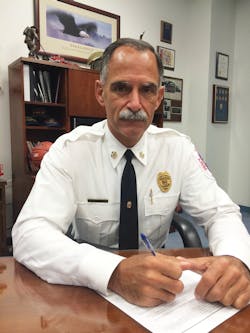Chief Concerns: Just Do the Right Thing (JDTRT!)
For years you’ve likely heard folks in a hurried frenzy tell others, “I don’t know, just do the right thing!” In our admittedly acronym-dysfunctional world, JDTRT was my rally cry as a battalion chief in the 1990s—a rally cry not borne out of chaos, but out of a focused desire to do what was RIGHT for our people, the people we serve and our department as a whole.
Constantly caught between the political realities of seesaw budget environments, ever-changing communities and near-constant “standard” changes, our younger firefighters and station officers needed guidance. While at first JDTRT may have been perceived as placating, the reality WAS (and still IS) that there is NOT a book on the shelf or a plaque on the wall to tell you how to handle EVERY situation you will come across. Sometimes, you just need to do the right thing!
As I retire from my post as the second-longest serving fire chief for the Prince George’s County, MD, Fire/EMS Department, some reflection on the relative success may help others in developing that “right thing” moral and mental focus, not to mention a high level of productivity as well. You’ve heard about sixth sense and most assuredly you’ve heard people yell, “Use common sense!” Sixth sense and common sense can be the same thing. Herein we’ll talk about developing and honing that sixth sense in order to apply common sense to everyday situations—guidance that will hopefully make a difference for you.
Honing the wall judge
Some of what we do is fairly cut-and-dry: wear PPE, apply seatbelts, fill out paperwork, etc. In other words, “Do what the general order says and everything will be OK.” Understanding the reactionary business we have typically been in, most general orders are rooted in the basis of some particular moment of chaos, which provides an easy framework and working platform for the application of a general order. It’s the things happening even just a little bit outside of the norm that may test your sixth sense and common sense resolve.
After 35 years working and watching in this business, two things are abundantly apparent two me: 1) I don’t know everything and 2) neither does anyone else. But more than 30 years in one of the busiest fire and EMS organizations in the country has provided some insights that helped me develop and hone my sixth sense.
In my last article, I spoke about my upbringing as being fairly rigid and stark. Much like every kid, there was every opportunity for me to fall by the proverbial wayside. For the longest time, I could not go outside the house without someone recognizing me as the “preacher’s kid,” which meant I couldn’t do anything wrong without it getting back to dad. My choices were rebellion or capitulation. Thankfully, I guess I capitulated and did not sway from the generally straight-and-narrow.
The decision to abstain from alcohol was easy at home; there was none in the house. And strangely enough, considering what most people might think, it became easier after joining the volunteer fire service. I endured the truly sobering experience as a 16-year-old volunteer firefighter and EMT of picking up 18 of my graduating classmates who died in drunk-driving accidents. (This was also the era that birthed Mothers Against Drunk Driving, aka MADD).
I say all of that to explain how my moral compass evolved, from church upbringing to public safety. Mind you, I don’t pretend to be an angel any more than I pretend to know everything! Today, I use and teach a “wall judge” to balance that sixth sense with common sense. The wall judge isn’t necessarily one location, but becomes a focus spot for deliberation, regardless of where I am or what I’m dealing with. It’s an internal judge by which you can “self-check” to gauge your decisions.
Focusing back to “doing the right thing,” there are books and plaques to help you make many decisions; however, when that moment strikes you and you have the time to deliberate, use a wall judge to help you focus on what the right thing means in that situation. If the judge shrugs shoulders or makes no expression, you’re probably OK. If the judge gives you the stink eye, you’re probably on the fence, at best. And if you get the square in the face look, like “are you crazy?” you’re probably getting ready to do the WRONG thing. That’s the sixth sense. After time, you KNOW what the right thing means. There’s no shame in using that wall judge to help you along.
It’s those times when the judge tilts the head and gives you a little stink eye that builds common-sense character. This goes back to the not-a-book-on-the-shelf concept. While there might be help out there, your sixth sense is telling you something might be wrong—maybe you should slow down. Finessing that art has been one of the most successful parts of my administration as fire chief. Whether it’s been a dispute, a request or a community concern, my wall judge has been pretty much spot on.
Some things don’t require a sixth sense or, frankly, even common sense. They just require an elementary education. Administratively, I see fire chiefs (and others) embarrass themselves and their organizations many times, with tense, spelling and other writing errors. Mind you, the way these articles are written, I’m trying to have a conversation with you, so the editors give me some latitude to the use of hyphens, italics, etc. But I’m talking about the SIMPLE things, like just being grammatically correct: there, their, they’re; too, to, two; where, wear, ware; sight, site, cite; four, for, fore. There are many more examples. What you say, how you say it, and how you present and use it matters. The presentation of a professional piece of work (letter, memo, Facebook post, etc.) with proper grammar makes a difference and will help you build confidence over time. Confidence will translate into the demonstration of more common sense and better decision-making skills.
Operationally, MOST of our incidents are routine—not necessarily non-taxing, but simply routine. Over the course of these past 35 years, I have responded to or shown up at thousands of incidents scenes. Having been in charge of many of them, honing the operational sense has been much more about training and practical experience. We don’t typically have time for wall judges while the house is burning down. And if you don’t know the difference between right and wrong at our “bread-and-butter” house fire, maybe you’re in the wrong line of business. If you’ve responded on calls, trained like you mean it and taken advantage of the development opportunities available to you, you likely have the knowledge, skills and abilities (KSAs) to successfully mitigate our “routine” fires—without the need for your judge.
Your judge can come into play during overhaul and/or at suspicious scenes, when firefighters are taking souvenirs or relics from the scene—bad mojo there! Some of the larger and more complex incidents (significant hazmat scenes, defensive operations, etc.) might give you the opportunity to exercise the wall judge concept. Keep community and crew safety in the forefront, and when it’s time to slow down and think about it, take the time; don’t rush through just because dinner is getting cold.
Remember THE PROMISE
And then there’s the moral and ethical values that we should consider sacred as public safety officials. Paid or volunteer, we’re here to serve the community, not the other way around and not for some other self-serving or corporate necessity. There will be many opportunities to test your moral and ethical values. As a standard, we here in Prince George’s County use THE PROMISE (Trust Honor Ethics; Professionalism, Responsiveness, Outreaching, Mentoring, Inspirational, Safe, Energetic) as an individual and organizational compass of values. The core of any set of public safety values MUST BE Trust, Honor, and Ethics. Your community and your folks MUST be able to trust you and the things you do. It is your duty to honor that public (and private) trust—and honor tradition, honor sacrifice and honor your sacred duty. The honor to have the public’s trust can only be upheld by ensuring that you maintain the highest standards of ethics in everything you do. Any opportunity to stray—accepting illegal gratuities, pay-for-play schemes or “harmlessly” taking that badge-of-honor trophy from the fire scene—must be resisted.
It is our duty and responsibility to serve our communities, to honor and take care of our own, and to take care of our organizations. It is imperative that we EARN and MAINTAIN the publics’ trust, which we can achieve with a solid ethical and moral compass. Remember, there is NOT always a book on the shelf or a plaque on the wall to tell you how to get there, but there might be a wall judge to help. Sometimes, it means you must, well, just do the right thing. JDTRT!

Marc S. Bashoor
MARC S. BASHOOR joined the fire service in 1981. In 2017, he retired as fire chief of Prince George’s County, MD, Fire/EMS, the largest combination department in North America. His progressive community-based approach led to record hiring and a strategic apparatus replacement plan.
Twitter: @ChiefBashoor
Email: [email protected]






